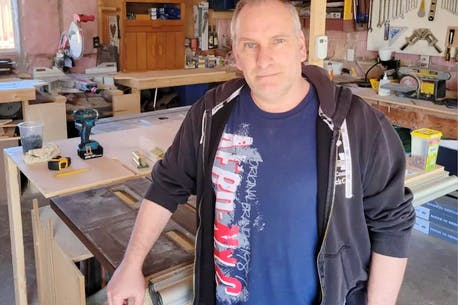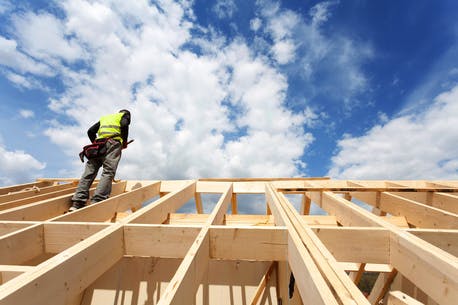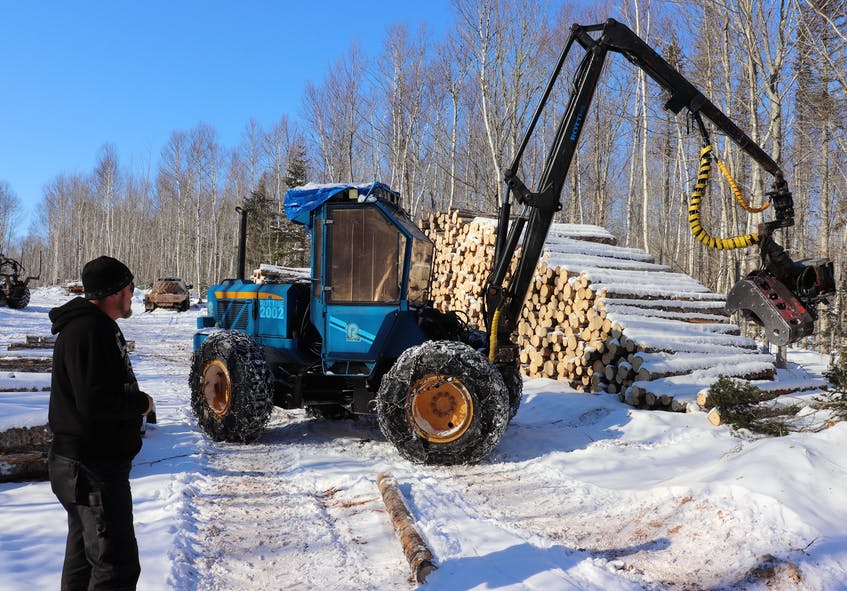CHARLOTTETOWN, P.E.I. — Sawmill owners in Prince Edward Island will soon have access to a new revenue stream that may also contribute to the province’s net zero plan, but professionals in the field say more infrastructure is needed to get involved in the process.
Starting this spring, P.E.I. sawmill owners will be able to stamp construction-grade lumber in the province, the minister of agriculture announced in the legislative assembly on Feb. 25.
Responding to opposition questions, Bloyce Thompson said potential graders have already spoken up about becoming certified.
“Right now, we have eight people interested in taking the course for stamping lumber, which is going to be offered as soon as possible. We’re looking at early April to early May and it will be no cost to whoever takes the course and it will be offered here on Prince Edward Island.”
Agriculture Minister Bloyce Thompson - Stu Neatby/SaltWire File
Opposition leader Peter Bevan-Baker brought up lumber during a line of questioning around the net zero plan.
“One of the issues that woodlot owners face here on Prince Edward Island, which contributes to the tendency to clearcut rather than sustainably harvest their forests, is the absence of mills here on P.E.I. able to stamp Prince Edward Island-produced lumber,” noted Bevan-Baker.
Read more
Frustration builds as P.E.I. residents struggle with high lumber prices
Changes to building requirements begin March 31 across P.E.I.
Local upside
Bruce Craig, co-owner of Craig Wood Products Ltd. in Tyne Valley, sees a benefit to woodlot owners being able to use local mills for their lumber.
“Then you get to use Island lumber. The other way, the lumber leaves P.E.I. and goes to New Brunswick.”
Other woodlot owners are interested too, he said.
“Woodlot owners don’t want the logs to leave the Island. They want them to stay here and be used for Island projects and the Island economy.”
While Craig is not certain about getting the training himself, he does have the necessary equipment to take advantage of it.
“Woodlot owners don’t want the logs to leave the Island. They want them to stay here and be used for Island projects and the Island economy.”
– Bruce Craig
Bureau
That equipment is key, said Kevin Merriam, executive director of the Maritime Lumber Bureau.
“If somebody were interested in obtaining grade stamps for stamping their own lumber, they would have to have some sort of a facility, whether that be a sawmill or a re-manufacturing facility.”
Kevin Merriam is the executive director of the Maritime Lumber Bureau. - Contributed
An interested operator would also have to become a paying member of the bureau, which is an accredited agency under Canadian and U.S. authorities, to ensure lumber meets the applicable grade standards of the National Lumber Grades Authority (NLGA), he said.
Anyone stamping lumber in P.E.I. would then become a member-mill who is actually leasing the bureau’s registered trademark in order to grade stamp their lumber products, he said.
“You have to follow the regulatory frameworks and the proper protocols to access grade stamps from us.”
At a glance
Following are some of P.E.I’s sawmills:
- Craig Wood Products (Tyne Valley)
- Arsenault Family Lumber (Richmond)
- Sharpe Construction (Kensington)
- Mount Herbert Sawmill (Mount Herbert)
- Timber Koke’s (Brooklyn)
- Junior Miller (St. Theresa)
Woodlot association
The P.E.I. Woodlot Owners Association website lists 14 sawmills in the province.
The association’s 2021 summer newsletter, however, points out no one in P.E.I. is authorized to grade and stamp lumber.
“No one has ‘got a stamp,’ even though there is strong demand for one. To get one, a mill worker or owner must attend and pass a special grading course (in Amherst).”
Under the national building code, lumber used for construction must be graded and stamped with information about tree species, grade, moisture content and originating mill, the newsletter said.
P.E.I. woodlots produce spruce, fir and pine, the softwoods used for construction, but those woodlots can’t turn it into lumber for construction. Instead, if they want to harvest softwood, they have to ship it off-Island for processing, the newsletter said.
Dan Dupont watches as Desie MacNevin operates a machine that can simultaneously cut down and pick up a whole tree, and then hold that tree in midair while cutting it into shorter pieces. - Logan MacLean
Sustainability
While the program offers a potential economic benefit for lumber producers, Dan Dupont of Working Forest P.E.I. is more interested in its role in sustainable forestry.
Dupont, who has been working in forestry for 30 years, does not think a lumber grading course will be enough on its own to stop unstainable clearcutting in Island forests.
“It’s not the product that’s creating the clearcutting. It’s people’s behaviour,” he said. “Is it going to help? Yes. If we have some kind of certification program to stamp it as sustainably sourced wood, yes it will help. But to put that level of credit on a stamp — will that solve our issues with sustainable management? No.”
Like Merriam, Dupont pointed out just how much actually goes into the process of making lumber for construction.
“We’re missing a lot of things,” he said. “We need kilns to dry the wood. We need planers to make it construction-ready.”
Dan Dupont in a stand of trees that are undergoing sustainable cutting, which removes trees near the end of their lifespan to encourage growth of younger trees nearby. - Logan MacLean
This means some operations just won’t be able to afford to grade and stamp lumber, even if they take the course, he said.
Still, the grading program is a good start, Dupont said. He just thinks it will need co-operation between owners and government, so that smaller operators can get involved, too.
“If we work together as a whole like we have for the last 200 years, we can make this happen. But if a small sawmill wants to get his own stamp and do his own thing to create his own destiny, which is his absolute right — I think we can make a much more significant change, positive change, if we work in sync together.”
Logan MacLean is a reporter with the SaltWire Network in Prince Edward Island.
Logan MacLean · Reporter






